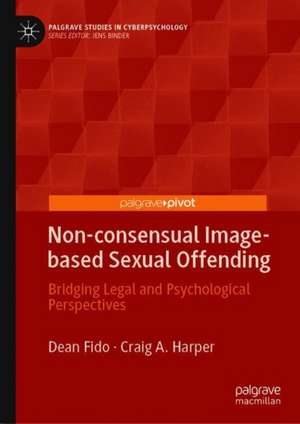Non-consensual Image-based Sexual Offending: Bridging Legal and Psychological Perspectives: Palgrave Studies in Cyberpsychology
Autor Dean Fido, Craig A. Harperen Limba Engleză Hardback – 3 noi 2020
Preț: 481.97 lei
Nou
Puncte Express: 723
Preț estimativ în valută:
92.23€ • 96.53$ • 76.76£
92.23€ • 96.53$ • 76.76£
Carte tipărită la comandă
Livrare economică 31 martie-14 aprilie
Preluare comenzi: 021 569.72.76
Specificații
ISBN-13: 9783030592837
ISBN-10: 3030592839
Pagini: 96
Ilustrații: IX, 96 p. 3 illus.
Dimensiuni: 148 x 210 mm
Greutate: 0.28 kg
Ediția:1st ed. 2020
Editura: Springer International Publishing
Colecția Palgrave Macmillan
Seria Palgrave Studies in Cyberpsychology
Locul publicării:Cham, Switzerland
ISBN-10: 3030592839
Pagini: 96
Ilustrații: IX, 96 p. 3 illus.
Dimensiuni: 148 x 210 mm
Greutate: 0.28 kg
Ediția:1st ed. 2020
Editura: Springer International Publishing
Colecția Palgrave Macmillan
Seria Palgrave Studies in Cyberpsychology
Locul publicării:Cham, Switzerland
Cuprins
Chapter 1. Introduction.- Chapter 2. Current legal provisions.- Chapter 3. Conceptualisations, motivations, and theoretical underpinnings.- Chapter 4. Judgements, social attitudes, and myths.- Chapter 5. Future Directions.
Notă biografică
Dean Fido is a lecturer in psychology at the University of Derby, UK. He has written and published papers on non-consensual image-based sexual offending specifically, as well as personality traits with the potential to motivate and drive such sexual offending more broadly.
Craig A. Harper is a senior lecturer in psychology and associate course leader (MSc Forensic Psychology) at Nottingham Trent University and Alumni Fellow of the University of Lincoln, UK. His research focuses on attitudes and responses to sexual offending and related topics. He is a member of the Heterodox Academy - an international organisation that seeks to promote intellectual and viewpoint diversity in higher education contexts.
Textul de pe ultima copertă
“The growth, and popularity, of the Internet is unprecedented. The rise of Internet usage has coincided with a variety of transnational forms of non-consensual image-based sexual offending. This book is a comprehensive exposé of this contemporary issue covering various aspects such as perpetrator motivations, impacts on victims/survivors and ultimately what can be done to stop this terrible crime. In doing so it makes an important contribution to this relatively unresearched topic.”
– Dr. Matthew Hall, Arden University, Coventry, United Kingdom
This book presents a timely analysis of the psychological influences, underpinnings, and predictors of non-consensual image-based sexual offending (NCIBSO), such as revenge pornography, cyber-flashing, deepfake media production and upskirting. In this rapidly expanding field, this book offers a novel perspective that encompasses both a forensic psychoanalytic analysis of offending behaviours and an examination of the influence of our use of online environments and digital platforms on these behaviours. The authors begin by outlining the historical and legal context before moving on to a critique of previously posited motivating factors. Rather than conceptualising NCIBSO in purely gendered terms, they demonstrate the potential for a psychological framework to facilitate a better understanding of how and why people engage in a range of non-consensual sexual image offences. In doing so it will provide fresh insights for policymakers and clinicians, in addition to scholars from across the fields of psychology, sociology, criminology, law, media and gender studies.
Dean Fido is a lecturer in psychology at the University of Derby, UK. He has written and published papers on non-consensual image-based sexual offending specifically, as well as personality traits with the potential to motivate and drive such sexual offending more broadly.
Craig A. Harper is a senior lecturer in psychology and associate course leader (MSc Forensic Psychology) at Nottingham Trent University and Alumni Fellow of the University of Lincoln, UK. His research focuses on attitudes and responses to sexual offending and related topics. He is a member of the Heterodox Academy - an international organisation that seeks to promote intellectual and viewpoint diversity in higher education contexts.
– Dr. Matthew Hall, Arden University, Coventry, United Kingdom
This book presents a timely analysis of the psychological influences, underpinnings, and predictors of non-consensual image-based sexual offending (NCIBSO), such as revenge pornography, cyber-flashing, deepfake media production and upskirting. In this rapidly expanding field, this book offers a novel perspective that encompasses both a forensic psychoanalytic analysis of offending behaviours and an examination of the influence of our use of online environments and digital platforms on these behaviours. The authors begin by outlining the historical and legal context before moving on to a critique of previously posited motivating factors. Rather than conceptualising NCIBSO in purely gendered terms, they demonstrate the potential for a psychological framework to facilitate a better understanding of how and why people engage in a range of non-consensual sexual image offences. In doing so it will provide fresh insights for policymakers and clinicians, in addition to scholars from across the fields of psychology, sociology, criminology, law, media and gender studies.
Dean Fido is a lecturer in psychology at the University of Derby, UK. He has written and published papers on non-consensual image-based sexual offending specifically, as well as personality traits with the potential to motivate and drive such sexual offending more broadly.
Craig A. Harper is a senior lecturer in psychology and associate course leader (MSc Forensic Psychology) at Nottingham Trent University and Alumni Fellow of the University of Lincoln, UK. His research focuses on attitudes and responses to sexual offending and related topics. He is a member of the Heterodox Academy - an international organisation that seeks to promote intellectual and viewpoint diversity in higher education contexts.
Caracteristici
Presents a timely analysis of the psychological influences and predictors of non-consensual image-based sexual offending (NCIBSO) Provides a psychological perspective on NCIBSO that draws on sex offending theory and an examination of the roles of personality and situational context Outlines testable hypotheses alongside potential explanations for the manifestation of image-based sexual offending Offers an overview of the current literature in the field as well as proposing directions for future research Examines the role of ‘rape myths’ as predictors of a proclivity to engage in NCIBSO
















